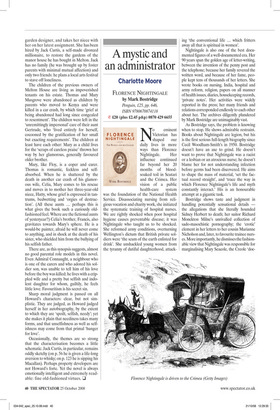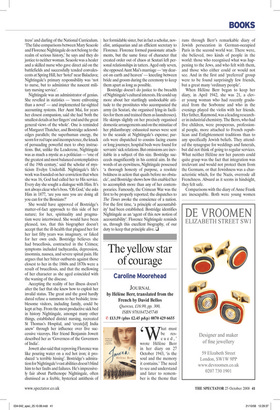A mystic and an administrator
Charlotte Moore
FLoRENCE NIGHTINGALE by Mark Bostridge Penguin, £25, pp. 646, ISBN 9780670874118 ✆ £20 (plus £2.45 p&p) 0870 429 6655 No eminent Victorian has shaped our daily lives in more ways than Florence Nightingale. Her influence continued far beyond her 20 months of bloodsoaked toil in Scutari and the Crimea. Her vision of a public health-care system was the foundation of the National Health Service. Disassociating nursing from religious vocation and charity work, she initiated the systematic training of hospital nurses. We are rightly shocked when poor hospital hygiene causes preventable disease; it was Nightingale who taught us to be shocked. She reformed army conditions, overturning Wellington’s dictum that British private soldiers were ‘the scum of the earth enlisted for drink’. She unshackled young women from the tyranny of dutiful daughterhood, attack ing ‘the conventional life ... which fritters away all that is spiritual in women’.
Nightingale is also one of the best documented figures of a well-documented era. Her 90 years span the golden age of letter-writing, between the invention of the penny post and the telephone; because her family revered the written word, and because of her fame, people kept tens of thousands of her letters. She wrote books on nursing, India, hospital and army reform, religion, papers on all manner of health issues, diaries, housekeeping records, ‘private notes’. Her activities were widely reported in the press; her many friends and relations corresponded endlessly to each other about her. The archives diligently plundered by Mark Bostridge are unimaginably vast.
As Bostridge says, the problem is knowing when to stop. He shows admirable restraint. Books about Nightingale are legion, but his is the first serious full-length biography since Cecil Woodham-Smith’s in 1950. Bostridge doesn’t have an axe to grind. He doesn’t want to prove that Nightingale was a racist or a lesbian or an atrocious nurse; he doesn’t blame her for not understanding infection before germs had been discovered. He aims to shape the mass of material, ‘set the factual record straight’, and ‘trace the way in which Florence Nightingale’s life and myth constantly interact.’ His is an honourable attempt at a gigantic task.
Bostridge shows taste and judgment in handling potentially sensational details — the allegations that she literally hounded Sidney Herbert to death; her suitor Richard Monckton Milne’s unrivalled collection of sado-masochistic pornography; the ‘erotic’ element in her letters to her cousin Marianne Nicholson and, later, to favourite trainee nurses. More importantly, he dismisses the fashionable view that Nightingale was responsible for marginalising Mary Seacole, the Creole ‘doc tress’ and darling of the National Curriculum. ‘The false comparisons between Mary Seacole and Florence Nightingale do not belong to the realm of serious history,’ he says and they do justice to neither woman. Seacole was a healer and a skilled nurse who gave direct aid on the battlefields and successfully tended convalescents at Spring Hill, her ‘hotel’ near Balaclava; Nightingale’s primary responsibility was ‘not to nurse, but to administer the nascent military nursing service’.
Nightingale was an administrator of genius. She revelled in statistics — ‘more enlivening than a novel’ — and implemented far-sighted accounting systems. Her Aunt Mai, for years her closest companion, said she had ‘both the smallest details at her fingers’ end and the great general views of the whole’. One is reminded of Margaret Thatcher, and Bostridge acknowledges parallels; the superhuman energy, the scorn for red tape and incompetence, the knack of persuading powerful men to obey instructions. But, unlike the Leaderene, Nightingale was as much a mystic as a politician — ‘one of the greatest and most balanced contemplatives of the 19th century,’ said the scholar of mysticism Evelyn Underhill. Nightingale’s life’s work was founded on her conviction that when she was 16, God had called her to His service. Every day she sought a dialogue with Him. It’s not always clear who’s boss. ‘Oh God,’ she asks Him in 1877, ‘are you sure you are doing all you can for the Bosnians?’ She would have approved of Bostridge’s matter-of-fact approach to this side of her nature; for her, spirituality and pragmatism were intertwined. She would have been pleased, too, that this biographer doesn’t accept that the ill-health that plagued her for her last fifty years was imaginary, or faked for her own ends. Bostridge believes she had brucellosis, contracted in the Crimea; symptoms included tachycardia, depression, insomnia, nausea, and severe spinal pain. He argues that her bitter outbursts against those closest to her in the 1860s and 1870s were a result of brucellosis, and that the mellowing of her character as she aged coincided with the waning of the disease.
Accepting the reality of her illness doesn’t alter the fact that she knew how to exploit her invalid status. The great and the good hardly dared refuse a summons to her bedside; troublesome visitors, including family, could be kept at bay. From the most productive sick bed in history Nightingale, amongst many other things, established district nursing, recreated St Thomas’s Hospital, and ‘create[d] India anew’ through her influence over five successive viceroys. Her friend Benjamin Jowett described her as ‘Governess of the Governors of India’.
Jowett also said that reproving Florence was like pouring water on a red hot iron; it produced ‘a terrible hissing’. Bostridge’s admiration for Nightingale’s vast abilities doesn’t blind him to her faults and failures. He’s impressively fair about Parthenope Nightingale, often dismissed as a feeble, hysterical antithesis of her formidable sister, but in fact a scholar, novelist, antiquarian and an efficient secretary to Florence. Florence formed passionate attachments, but the same force of character that created order out of chaos at Scutari left personal relationships in tatters. Aged only seven, she opposed Aunt Mai’s marriage — ‘my dearest on earth and heaven’ — kneeling between bride and groom during the ceremony to keep them apart as long as possible.
Bostridge doesn’t do justice to the breadth of Nightingale’s cultural interests. He could say more about her startlingly unshockable attitude to the prostitutes who accompanied the army (in Scutari, she organised lying-in facilities for them and trained them as laundresses). He skimps slightly on her precisely organised domestic arrangements and on the minutiae of her philanthropy: exhausted nurses were sent to the seaside at Nightingale’s expense; parcels were dispatched to cousins facing exams or long journeys; hospital beds were found for servants’ sick relations. But omissions are inevitable in a subject of this size. Bostridge succeeds magnificently in his central aim. In the words of an eyewitness, Nightingale possessed ‘a thorough honesty of purpose, a resolute boldness in action that quails before no obstacle’, and Bostridge shows how this enabled her to accomplish more than any of her contemporaries. Famously, the Crimean War was the first to be properly reported; the dispatches to The Times awoke the conscience of a nation. For the first time, ‘a principle of accountability’ had been established. Bostridge identifies Nightingale as an ‘agent of this new notion of accountability’. Florence Nightingale reminds us, through this excellent biography, of our duty to keep that principle alive. q



















































































 Previous page
Previous page